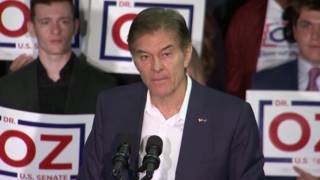HeadlinesJanuary 02, 2020
Iranian-Backed Militia Withdraws After Standoff at U.S. Embassy in Baghdad
In Iraq, members of an Iranian-backed militia and its supporters have withdrawn from the Green Zone after a two-day standoff outside the U.S. Embassy in Baghdad. The militia members broke into a gatehouse at the perimeter of the sprawling embassy Tuesday, setting fire to the structure. On Wednesday, U.S. troops tear-gassed the militia members. The militia withdrew after Iraqi Prime Minister Adel Abdul-Mahdi pledged to pursue legislation to force U.S. troops out of Iraq. This is Mohammed al-Haydari of the Popular Mobilization Forces.
Mohammed al-Haydari: ’”The American troops in Iraq are supposed to either train Iraqi forces or to combat terrorism, but the killing of members of the Hashd al-Shaabi, this is something unacceptable. So, for this reason, we are coming here, until the U.S. troops leave Iraq.”
The embassy standoff came after the United States launched a slew of airstrikes in Iraq and Syria Sunday that killed at least 24 members of the Iranian-backed militia Kata’ib Hezbollah. The Iraqi prime minister had warned Defense Secretary Mark Esper against the airstrikes, which came as retaliation after an American contractor was killed in a rocket attack in Kirkuk, Iraq, Friday. The Pentagon has now sent 750 more troops to the Middle East, and Secretary of State Mike Pompeo has delayed a trip to Ukraine and four other nations.
The showdown at the U.S. Embassy in Baghdad comes amid months of anti-government protests in Iraq. These protesters say they were not part of the showdown at the U.S. Embassy and that they are opposed to corruption and Iranian influence in Iraq.
Reports: 9 Civilians Killed in Syrian Government Strike on School in Idlib
In Syria, aid workers say Syrian government artillery fire killed at least nine civilians — including five children — on New Year’s Day in the northwestern province of Idlib, which is facing a heavy bombing and a ground offensive by the Russian-backed Syrian government. Aid workers say at least 16 more civilians were injured in the cluster munitions bombing of a school where displaced people were taking refuge. Over the last month, nearly 300,000 civilians have been forced to flee the Syrian government’s offensive against Idlib, which is home to about 3 million civilians, more than 75% of whom are women and children. Since April, at least 60 health facilities have been bombed in the region, sparking the United Nations to launch a limited inquiry into seven of the incidents. We’ll have more on the offensive in Idlib later in the broadcast.
Wildfires Rage in Australia; Floods Kill 16 in Indonesia
In Australia, the eastern state of New South Wales has declared a week-long state of emergency amid raging climate-fueled wildfires. Thousands of residents and tourists are fleeing the area. In the neighboring state of Victoria, troops are preparing to evacuate thousands more people who are trapped by the fires there. At least 4,000 were forced to flee to the beach to escape the approaching blazes.
The unprecedented fire season in Australia comes as the Indonesian capital of Jakarta was inundated by the worst rainfall in nearly a quarter-century. At least 21 people have died in the flooding, and more than 60,000 were forced to evacuate their homes. Both increasingly powerful wildfires and extreme rainfall have been linked to climate change.
Tens of Thousands Protest in Hong Kong on New Year’s Day
Across the world, protesters celebrated the New Year by taking to the streets to demand more democracy and to protest economic austerity. In Hong Kong, tens of thousands of people marched on New Year’s Day to demand more political autonomy from Beijing. Police arrested 400 protesters, bringing the total number of people arrested in the ongoing pro-democracy protests in Hong Kong to over 7,000.
Thousands March in Santiago, Chile, Against Austerity on New Year’s Day
In Chile, thousands poured into the streets of the capital Santiago to protest economic inequality and to commemorate the 26 people who have been killed during the ongoing demonstrations. This is Sandra, one of the Chilean protesters.
Sandra: “We came because we have been protesting for months. The government has not listened to us, pretended not to know, and have evaded us. They have done unconstitutional things. And we come to 'celebrate,' in quotes, because it is not a celebration. We came to commemorate all those who have been injured and killed by this government.”
French Rail Workers’ Strike Now Longest Since 1968
In France, union workers continue their strike to protest French President Emmanuel Macron’s efforts to raise the retirement age. It is now France’s longest rail workers’ strike since 1968. During Macron’s New Year’s Day address, he vowed to press ahead with his efforts to overhaul the pension system. This is union representative Hani Labidi.
Hani Labidi: “Since the first day, December 5th, we have been calling for this reform to be withdrawn completely, and today we’re respecting the same line. The statement that he, Macron, has now made doesn’t surprise us, because we weren’t expecting anything from him. He’s a president who’s full of himself, who doesn’t listen to the people. You have to bear in mind that Macron has to listen to the French people; it’s not the French people who have to listen to Macron.”
Netanyahu Asks Parliament for Immunity in Corruption Cases
In Israel, Prime Minister Benjamin Netanyahu has asked the Israeli parliament to grant him immunity from prosecution in three corruption cases he has been indicted in. Netanyahu’s rare and unpopular move means he could remain out of court for as long as he serves in parliament. Netanyahu is the longest-serving Israeli prime minister. He’s running for a fourth consecutive term in an election on March 2 — the third national election in Israel in less than a year.
16 People Killed in Prison Riot in Zacatecas, Mexico
In Mexico, at least 16 prisoners were killed when a riot erupted in a prison in the central state of Zacatecas. Mexico’s prisons are notoriously overcrowded. Tuesday’s violence follows another deadly prison riot in October in which six prisoners were killed in the central state of Morelos.
Pope Francis Condemns Violence Against Women in New Year’s Day Speech
Pope Francis condemned violence against women during his New Year’s Day address at the Vatican.
Pope Francis: “Women are sources of life. Yet they are continually offended, beaten, raped, induced to prostitute themselves and to suppress the life they carry in their womb. All violence inflicted on women is a desecration of God, born of a woman.”
On Wednesday, Pope Francis also apologized for slapping away the hand of a woman on New Year’s Eve, in a video that has since gone viral.
Scores of New Laws Take Effect Across the United States
Scores of new laws are taking effect across the country with the start of 2020, affecting wages, privacy rights, gun laws, marijuana use, criminal justice and more. The minimum wage has gone up in 21 different states and in about two dozen cities and counties across California.
The California Consumer Privacy Act now allows California residents to learn what data companies have collected about them — and to demand those companies delete the data, if residents want.
California has also suspended the statute of limitations for sexual abuse crimes for three years, allowing survivors the chance to pursue prosecution.
Colorado has tightened its gun laws, although a number of Colorado counties oppose the new measure and have declared themselves to be Second Amendment “sanctuaries.” Tennessee has loosened its gun laws by making it easier for residents to receive a concealed-carry handgun permit.
In Illinois, marijuana is now legal.
In New York, cash bail has been eliminated for most misdemeanor and nonviolent felony cases, in a move criminal justice reform advocates say could lead to the release of thousands of people incarcerated before their trial.
Oregon now bans single-use plastic bags at grocery stores.
And California has become the first state in the country to explicitly ban discrimination against people based on their natural hair. The CROWN Act now makes it illegal for employers or school officials to impose dress codes or policies that ban afros, braids, locks or other hairstyles. California state Senator Holly Mitchell celebrated the move, saying, “This law protects the right of black Californians to choose to wear their hair in its natural form, without pressure to conform to Eurocentric norms.”
Most popular
- 1
- 2
- 3
- 4
Non-commercial news needs your support
Please do your part today.











Media Options